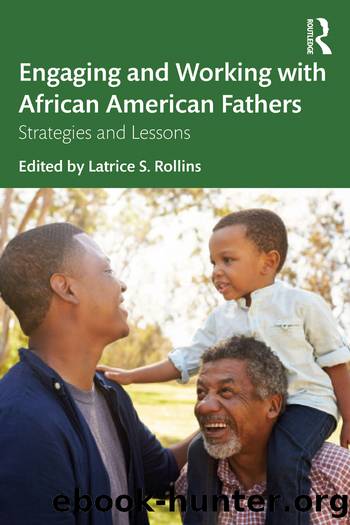Engaging and Working with African American Fathers by Latrice S Rollins

Author:Latrice S Rollins [Rollins, Latrice S]
Language: eng
Format: epub
ISBN: 9780367231255
Barnesnoble:
Goodreads: 54418179
Publisher: Routledge
Published: 2020-12-31T00:00:00+00:00
Practice
CRT begins with the notion that racism is a normal part of American society (Bell, 1995; Ladson-Billings, 1998). CRT asserts racism is so enmeshed in the fabric of American society that it appears normal. CRT has six foundational tenets that include racism is a normal part of American society; CRT expresses skepticism towards dominant legal claims of neutrality, objectivity, colorblindness, and meritocracy; CRT challenges ahistoricism and insists on a contextual/historical analysis of the law; CRT insists on the recognition of the experiential knowledge of people of color; CRT is interdisciplinary and takes into account the intersectionality of various forms of subordination and oppression (e.g., race, class, gender); and CRT works towards the elimination of racial oppression as a part of the larger goal of ending all forms of oppression (Dixson & Rousseau, 2005).
Calmore (as cited in Tate, 1997) stated:
Critical race theory challenges the universality of White experience/judgment as the authoritative standard that binds people of color and normatively measures, directs, controls, and regulates the terms of proper thought, expression, presentation, and behavior. As represented by legal scholars, critical race theory challenges the dominant discourse on race and racism. (pp. 196â197)
According to Ladson-Billings and Tate (1995) âvoice,â or naming oneâs own reality, is also a theme of CRT. Critical race theorists revere parables, chronicles, stories, counterstories, poetry, fiction, and revisionist histories. CRT departs from mainstream scholarship by focusing on the experiential knowledge of people of color (Ladson-Billings, 1998), and CRT recognizes that the experiential knowledge of people of color is legitimate, appropriate, and critical to understanding race (Solorzano & Yasso, 2001) and how race operates and permutes to affect the lives of people of color (Ladson-Billings & Donnor, 2005). CRT permits researchers to privilege the âvoiceâ of people of color to hear the counterstories of people of color, specifically the counterstories of African American fathers. According to Delgado (1995), counterstories are stories that âcounterâ or act to deconstruct the dominant or master narrative and present another side to the dominant discourse (Milner IV, 2012; Solorzano & Yasso, 2002; Tate IV, 1997). Counterstories go against the established order and control (Berry III, Thunder, & McClain, 2011). Counterstories are critical of the master narrative and come out of the experiences of individuals from marginalized groups whose voice, perspective, and consciousness have been suppressed and devalued (Bell, 1995; Berry III et al., 2011; Delgado, 1995; Solorzano & Yasso, 2002).
CRT allowed the researcher to partner with African American fathers to hear their counterstories and to utilize their âvoiceâ to understand how African American fathers are involved in their childrenâs education. CRT also permitted the researcher to collaborate with African American fathers to construct a sense of human agency to support their African American children with academic achievement (Ladson-Billings & Donnor, 2005) for the betterment of society as a whole. These stories and counterstories were obtained by interviewing individuals that self-identify as African American males and as being the father of a school-age child. A narrative method allowed the researcher to obtain detailed stories and counterstories
Download
This site does not store any files on its server. We only index and link to content provided by other sites. Please contact the content providers to delete copyright contents if any and email us, we'll remove relevant links or contents immediately.
Should I Stay or Should I Go? by Ramani Durvasula(7669)
The Lost Art of Listening by Michael P. Nichols(7506)
The Rosie Project by Graeme Simsion(6415)
Beartown by Fredrik Backman(5755)
We Need to Talk by Celeste Headlee(5615)
Ego Is the Enemy by Ryan Holiday(5450)
Hunger by Roxane Gay(4928)
Suicide Notes by Michael Thomas Ford(4827)
I Love You But I Don't Trust You by Mira Kirshenbaum(3876)
Mummy Knew by Lisa James(3693)
Not a Diet Book by James Smith(3429)
Crazy Is My Superpower by A.J. Mendez Brooks(3401)
Toxic Parents by Susan Forward(3292)
Girl, Wash Your Face by Rachel Hollis(3282)
The Complete Idiot's Guide to Coping With Difficult People by Arlene Uhl(3149)
The Social Psychology of Inequality by Unknown(3031)
Name Book, The: Over 10,000 Names--Their Meanings, Origins, and Spiritual Significance by Astoria Dorothy(2987)
The Hard Questions by Susan Piver(2976)
The Gaslight Effect by Dr. Robin Stern(2794)
